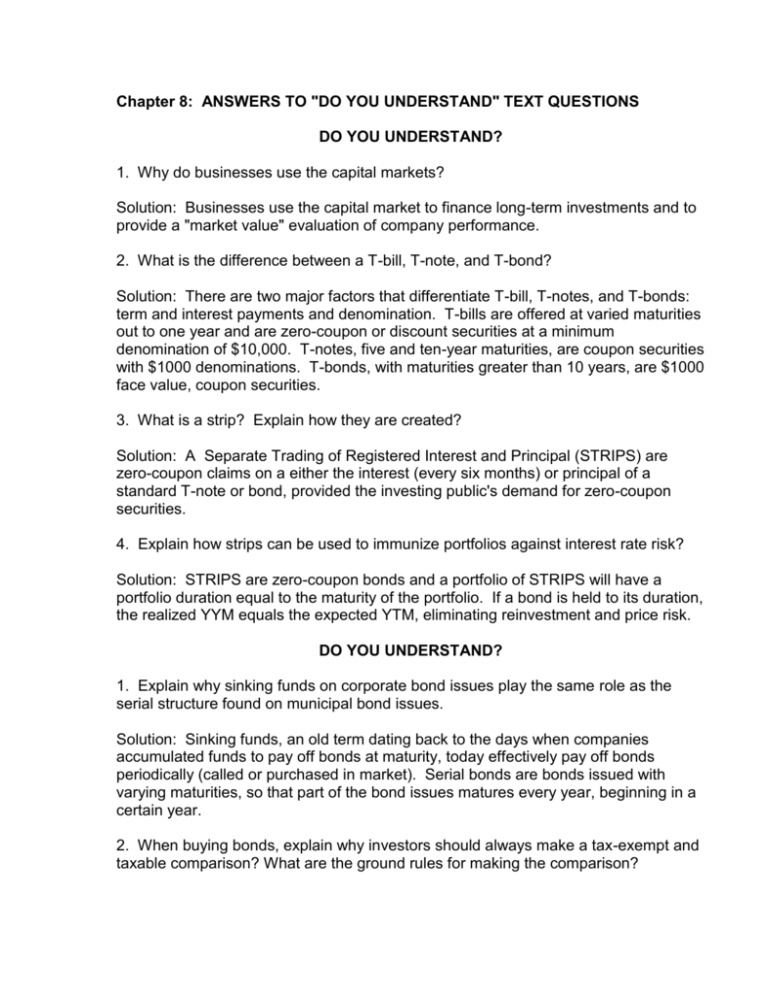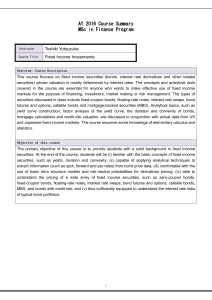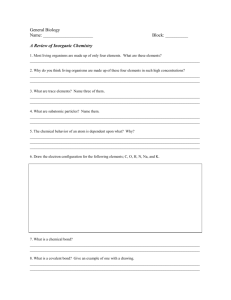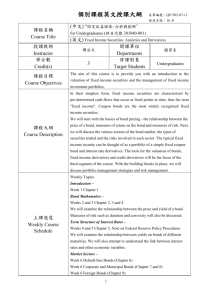Chapter 7: ANSWERS TO "DO YOU UNDERSTAND" TEXT
advertisement

Chapter 8: ANSWERS TO "DO YOU UNDERSTAND" TEXT QUESTIONS DO YOU UNDERSTAND? 1. Why do businesses use the capital markets? Solution: Businesses use the capital market to finance long-term investments and to provide a "market value" evaluation of company performance. 2. What is the difference between a T-bill, T-note, and T-bond? Solution: There are two major factors that differentiate T-bill, T-notes, and T-bonds: term and interest payments and denomination. T-bills are offered at varied maturities out to one year and are zero-coupon or discount securities at a minimum denomination of $10,000. T-notes, five and ten-year maturities, are coupon securities with $1000 denominations. T-bonds, with maturities greater than 10 years, are $1000 face value, coupon securities. 3. What is a strip? Explain how they are created? Solution: A Separate Trading of Registered Interest and Principal (STRIPS) are zero-coupon claims on a either the interest (every six months) or principal of a standard T-note or bond, provided the investing public's demand for zero-coupon securities. 4. Explain how strips can be used to immunize portfolios against interest rate risk? Solution: STRIPS are zero-coupon bonds and a portfolio of STRIPS will have a portfolio duration equal to the maturity of the portfolio. If a bond is held to its duration, the realized YYM equals the expected YTM, eliminating reinvestment and price risk. DO YOU UNDERSTAND? 1. Explain why sinking funds on corporate bond issues play the same role as the serial structure found on municipal bond issues. Solution: Sinking funds, an old term dating back to the days when companies accumulated funds to pay off bonds at maturity, today effectively pay off bonds periodically (called or purchased in market). Serial bonds are bonds issued with varying maturities, so that part of the bond issues matures every year, beginning in a certain year. 2. When buying bonds, explain why investors should always make a tax-exempt and taxable comparison? What are the ground rules for making the comparison? Solution: Everything else the same the investor is seeking the higher after-tax return. Calculate the after-tax return of the corporate or the pre-tax equivalent rate on the municipal bond, using the investor's marginal tax rate. 3. Why are commercial banks large investors in municipal bonds and property and casualty insurance companies are not? Solution: Until the Tax Reform Acts in the 1980's commercial banks were major investors in muni's. Households are the major investor in muni's today with mutual funds second and property/casualty insurance companies third. P/c companies have high tax exposure and seek tax sheltering via preferred stock and muni bonds. Life insurance companies, with considerable tax shelters coming from whole life policies, invest in taxable corporate bonds. 4. How do the secondary markets differ between municipal bonds and corporate bonds? Explain how and why the junk bond market had an impact on commercial bank lending? Solution: The secondary market for municipals is a dealer market and is quite thin, as are many corporate bond issues. There are more large-issues of corporates, some listed on exchanges, that trade more frequently in dealer markets. DO YOU UNDERSTAND? 1. Why are asset-backed securities becoming increasingly important in the capital markets? Solution: Many of them are tailored to provide characteristics, such as products with financial guarantees, predictable cash flows, or floating rate characteristics, that some buyers of capital market securities value highly, and thus are willing to pay a premium price to obtain. Since those tailored products are highly desirable, more of them are being created. 2. Why are financial guarantees becoming increasingly important in the financial markets both domestically and internationally? Solution: People need only to ascertain the creditworthiness of the guarantor and not the creditworthiness of each underlying asset. Furthermore, the interest cost saving from the improved credit-enhanced credit rating exceeds the cost of the guarantee. Financial guarantees are increasingly important in international markets as the creditworthiness of the guarantor is often easier to assess than the creditworthiness of the borrower. Also, because collection activities across borders are problematic, it often will be easier to collect from a guarantor that has a financial reputation to protect than from a defaulting borrower in another country. 3. What types of credit enhancement can be obtained to make asset-backed securities more desirable? Solution: Financial guarantees such as bond insurance, standby letters of credit, the use of cash collateral accounts, the use of subordinated tranches that enhance senior tranches by bearing the default risk, and the set-aside of profits and servicing fee accruals to protect buyers of tranches against future losses. 4. Why are financial markets regulated, and who is the principal U.S. regulator? Solution: Financial markets are regulated so people will retain confidence in them and continue to supply money to them. The SEC is the principal regulator.











